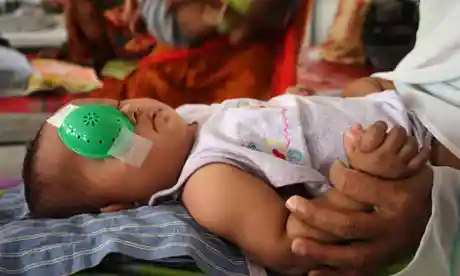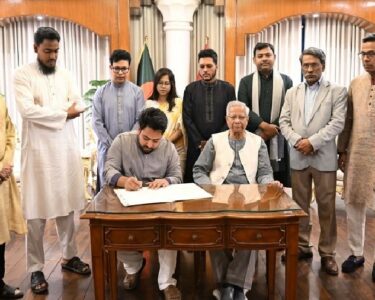বাংলাদেশ অন্ধত্বের অবসানের জন্য লড়াই করছে
Some battles just cry out to be won. Such is the case in Bangladesh, one of the world’s poorest countries, where a group of dedicated professionals is working hard to improve eyecare for the country’s youngest.
Bangladesh has almost 800,000 blind people (out of a population of 90 million), of whom 40,000 are children under the age of 15. Since 2004, more than 6,562 have been diagnosed with cataracts and 90% have received eye-restoring surgery.
According to the World Health Organisation, 87% of the visually disabled live in underdeveloped countries. Eye experts say 80% of blindness can be cured. However, 75% of the population of Bangladesh live in remote villages with few basic facilities. Besides being afraid of treatment and surgery, there is also the heavy cost of such help.
A poor diet, especially one lacking in vitamin A, a lack of education and no antenatal preparation for pregnant women all contribute to the high percentage of blindness in the country.
Blindness in Bangladesh is also a social problem. Blind people are excluded from employment and are a burden to their family. Daughters cannot be married, something that’s especially significant given that studies show women have a higher risk of being visually impaired. By having their vision restored, children in Bangladesh will be better equipped to survive in an impoverished country.
Moulvibazar, in north-east Bangladesh, has one of the largest eyecare centres in the region. Paediatric services were nonexistent until the worldwide charity Orbis International set up the country’s first dedicated centre at the Bangladesh Society for the Blind (BNSB) hospital there. The aim was to help reduce childhood blindness over a four-year period.
A child’s eye is different to an adult’s, so expertise is crucial. In 2006, Orbis sponsored three members of the paediatric ophthalmology team from West Suffolk hospital in Bury St Edmunds, Britain, who visited Bangladesh to provide training.
The team, comprising a paediatric ophthalmologist, an orthoptist and a paediatric surgery nurse, concentrated on surgical strategies for squints, droopy eyelids and paediatric cataracts. “We shared our knowledge and made treatment strategies for the patients,” said Dr Tony Vivian. “We were all particularly keen to promote the sharing of information with the parents of the children, which was not common practice in Bangladesh.”
Besides learning about surgical techniques, the BNSB group came to appreciate the value of teamwork. Techniques on examining patients were demonstrated and local workers were also taught how to document medical findings.
The parents of one girl were so overjoyed when their daughter recovered from the squint in her right eye that they started a national campaign to educate other parents; before and after pictures of Mou Dei were posted on billboards on prominent sites throughout Bangladesh. She is now a vivacious teenager with cosmetically straight vision.
The team returned again in 2008, covering new areas and focusing on a holistic approach. The paediatric operating-room nurse, Rachel Andrews, was particularly concerned about the lack of provision for alleviating the child’s fears. “Our second visit was to take them a step further in the complexity of the surgery and for me to train the nurses in best practice for the nursing of children,” she said.
Andrews returned as an unpaid volunteer earlier this year to share her nursing skills in the operating theatre and clinical settings, teaching on teamwork, improving the nurse-parent-child rapport and above all encouraging the doctors and nurses despite the constraints under which they were working.
She says the country’s desperate need spurs her on. Andrews is currently involved in raising funds to ship a container of decommissioned NHS equipment out to Bangladesh. Working with another charity, Aid to Hospitals Worldwide, which collects and repairs hospital equipment, she must find at least $10,000.
The contribution of this remote hospital in Bangladesh has been recognised over the years. Children now come from neighbouring India. The hospital administrator, Shah Fakhrul Islam, is full of hope. “We are trying our best to reach the people of villages to make them aware about blindness. Throughout the year, we organise training for village doctors and primary school teachers about primary eyecare. We are hopeful that we will be able to educate the poor people of our region about blindness. We believe this,” he said.
World Vision Day is 14 October
I hope you appreciated this article. Before you move on, I wondered if you would consider taking the step of supporting the Guardian’s journalism.
With this year’s session coming to an end, the supreme court’s approval ratings are at record lows and its legitimacy is in crisis.
That should come as no surprise: a far-right movement has helped seat justices who have redefined public life through precedent-shattering decisions that most Americans do not support. In addition to taking away the right to abortion from half the country and ending affirmative action, the supreme court has enabled a deluge of money into politics, the proliferation of guns in public spaces, the gutting of environmental protections and more.
As recent revelations have made clear, some supreme court justices do not follow basic ethical standards, and an absence of limits on their power means they can operate, in many ways, above the law.
That makes the job of journalists all the more important. At the Guardian, our reporting is produced to serve the public interest; we have no billionaire owner or shareholders to consider. And our unique, reader-supported model means that readers around the world can access the Guardian’s paywall-free journalism – whether they can afford to pay for news, or not.
(News: The Guardian)




